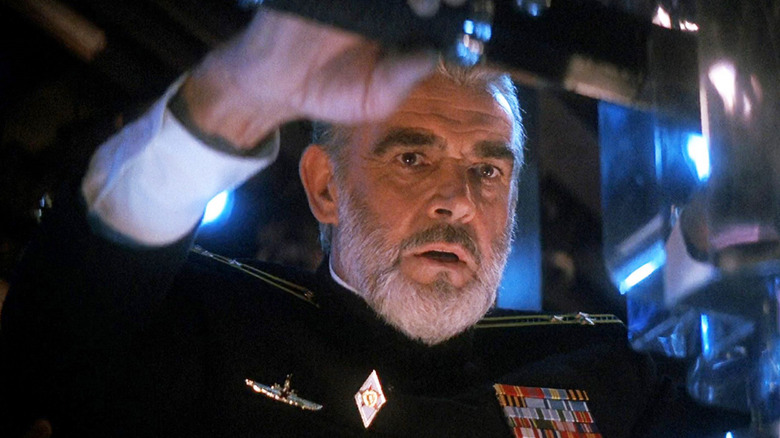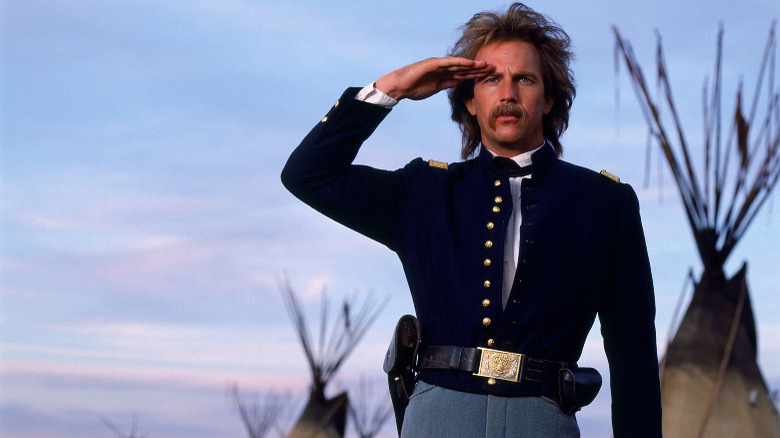Kevin Costner Took A Gamble When He Turned Down The Hunt For Red October
Directing a bonafide action movie classic is hard enough. Directing three of them in a row? I would say it's unheard of. Except that's exactly what John McTiernan did when he helmed "Predator," "Die Hard," and "The Hunt for Red October" one right after the other, releasing them from 1987 through 1990.
What makes this all the more impressive is how different these movies are from one another. "Predator" begins as your typical '80s shoot-em-up (complete with macho posturing and Arnold Schwarzenegger serving up cheesy one-liners), only to morph into a slasher film where the killer is a visitor from another world. "Die Hard" is similarly subversive in the way it centers on an everyman who saves the day through sheer determination, as opposed to being a musclebound force of nature like the '80s action heroes played by Schwarzenegger and Sylvester Stallone. This was more or less a happy accident, too. Bruce Willis was only cast as John McClane after, in essence, every other major action star at the time passed on the role.
McTiernan would shift gears yet again with "The Hunt for Red October," a tightly-structured, visually claustrophobic thriller where much of the "action" involves close-ups of people either staring intently at radar screens or staring intently at other people staring at radar screens. He initially wanted to cast Kevin Costner in the film as Jack Ryan, a role that would've reunited the actor with his "The Untouchables" costar Sean Connery (who plays the captain of the eponymous submarine). In the end, however, the part would go to Alec Baldwin, as Costner took a pass in order to go off and make his directing debut on the western "Dances with Wolves."
'I was doing the dumb thing'
Keep in mind, Costner was taking a gamble when he did this. The western genre had seen its popularity decline in the '80s, with "Pale Rider" and "Young Guns" among the few true success stories to emerge from that decade. Costner himself was coming off starring in 1985's "Silverado," a western that earned mostly positive reviews but only made a modest $32.2 million at the box office. With a price tag of $22 million and an untested director at the helm, "Dances with Wolves" was far from a sure bet.
In a 2016 interview with Variety for its Playback podcast, Costner explained that he was aware of this when he said no to "The Hunt for Red October." He added that his decision was fueled by his desire to finally make "Dance with Wolves" and didn't have anything to do with him holding out for more money:
"I know this: I had to turn down 'The Hunt for Red October' because I had promised I would do 'Dances [with Wolves'] and some people thought me saying no to 'Hunt for Red October' was that I needed more money. It wasn't more money. I had already postponed 'Dances' for a year and I wasn't going to do it now. I had all my things in place. In fact, if anything, it caused me a lot of pain because there was more money offered on 'Hunt for Red October' than I had ever seen in my life. So I was doing the dumb thing. I was putting up my money and leaving behind the biggest check I had ever seen."
As nice as it would be if artists were always rewarded for choosing projects they're really invested in over gigs that simply pay well, that's not always the reality in Hollywood or any other industry. Luckily, this was one of those occasions where things worked out nicely for all concerned parties. Both "Red October" and "Dances with Wolves" were critical and box office hits, especially the latter. They both took home Oscars too, with McTiernan's underwater adventure snagging the prize for Best Sound Effects Editing. Meanwhile, Costner's western epic landed seven Oscars total, with Costner winning for Best Director and Best Picture. So, again, all's well that ends well (this time).

